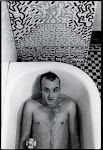
Last month we caught up with D. E. Fredd whose short fiction has appeared in many publications over the past four years. As with several creative artists, he has championed charitable causes, the most recent being eco-fiction.
Editor: Welcome to our pages. I think it might be worthwhile to begin by defining what you mean by eco-fiction.
DEF: Essentially it’s comprised of the author personally practicing sound ecological techniques and carrying that behavior over into his fiction. If you’ve watched any films from the 1940s and 1950s, you probably noticed how many people smoke. Every scene has characters lighting up. No doubt the viewing audience at the time saw this as accepted behavior. Such was the power of the media. We now know what the health risk was. In my writing I try to have each fictional character aware of sound environmental and recycling practices. If all fiction writers were to show their characters in this light, readers would soon recognize that as sound behavior.
Editor: Could you give some examples?
DEF: I won’t bore you with my personal life, but I do use recycled paper and have a compost bin. I have rearranged my workspace so that I write by natural light most of the time. We live in a rural area with our own well, but, if we didn’t, I would never drink bottled water. In the summer we use our garden for most of our produce. As far as my fiction goes, I wrote a story where the main character took his life by leaving the car running in the garage. That bothered me environmentally so I went back and changed it to having him hang himself using a hemp rope.
Editor: That seems like a small adjustment. I suppose you advocate manual strangulation over any other means of murder.
DEF: I would. I know it sounds strange, but the main focus is that all the characters in my stories, good and evil, are very aware of conserving energy and the ecological plight our planet is in. They’re not preaching by any means; they just display a respect for their environment.
Editor: Are there any other writers who are following your example?
DEF: Not that I’m aware of. It would be great if I could get a luminary like Nora Roberts to sign on.
Editor: Aside from using daylight to work and living off the land during the summer, are there any other conservation changes you’d like to see?
DEF: A growing area of concern for me right now is our nation’s infatuation with
Editor: As in bagels for breakfast?
DEF: Exactly. Think of the energy that could be saved if we all gave up toasting our carbohydrates. It certainly doesn’t enhance the nutritional value; in fact, it may kill most vitamins. It’s a coin flip as to whether rolls taste better. Every morning in the home and at restaurants, energy is consumed at record rates as we bow down before the great toaster god. And what’s wrong, I ask you, with a plain old cheese sandwich as opposed to grilled cheese. And why must we insist on toasted muffins and hot dog rolls? I could go on and on, but the point is that, if we are to shake off our energy dependence, sacrifices must be made. Would it kill us to have a slice of plain old bread each morning? I’m trying to think up an anagram for my cause. I like GUT, “Give Up Toast,” but I’m amenable to other suggestions.
Editor: Maybe our readers can come up with something, but is the boycott, if that’s what it is, going well?
DEF: As far as I’m concerned, personally, it is. My family isn’t as onboard as I might like. Untoasted English muffins are a tough sell. Let’s just say there have been some very tense mornings lately.
Editor: Well, we all have our little domestic battles to fight. I wish you the best with your eco-fiction and toast crusade.
DEF: Thank you for the opportunity to publicize my ideas. I really appreciate it. And there’s nothing wrong with room temperature food. America seems to have a religious aura about the “hot lunch” program for school kids and senior citizens.
Editor: We thank you for your time.
DEF: Sushi, now there’s a food that’s energy efficient--catch and chew.
Editor: Again, your ideas are interesting to say the least and we appreciate your sharing them.
DEF: If you don’t like fish, there is steak tartare. The French love it; it’s practically a national dish.
Editor: Good bye. My assistant will point you towards the exit.
DEF: Another pet peeve of mine is that computer keyboards need to be standardized. The delete key, depending on the laptop manufacturer, is always in a different place. It takes me a few seconds to locate it. That adds up over a day’s time.
Editor: Speaking of deletion . . . .
DEF: I’ll see myself out.
D.E. Fredd lives in Townsend, Massachusetts. He has had over one hundred and fifty short stories and poems published in literary reviews and journals. He received the Theodore Hoepfner Award given by the Southern Humanities Review for the bext short fiction of 2005 and was a 2006 Ontario Award Finalist. He won the 2006 Black River Chapbook Competition and received a 2007, 2009 and 2010 Pushcart Nomination. He has been included in the Million Writers Award of Notable Stories fro 2005, 2006, 2007 and 2010.
Photograph by Adam Lawrence.
Street artist unknown.
The bearded freak-folk boys from Fleet Foxes are back, and this is the title track from their new album due out May 3rd on Sub Pop.

No comments:
Post a Comment